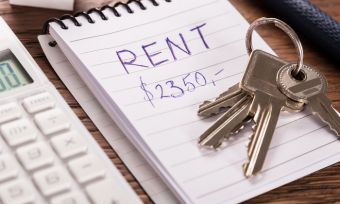Signing a lease on a new apartment or flat can be daunting. After all, they are typically for a year, and a lot can change over the course of a year. You could wind up hating your new place, or your new flatmate. You could get a job offer in a new city. Or, you could even suffer a drastic change to your finances, impacting your ability to afford your rent.
For whatever reason, seeing out a lease isn’t always practical. So, if you need out of your tenancy agreement, can you get out? Canstar guides you through everything to know about breaking your lease early.
Do you have a fixed-term lease or periodic agreement?
The first step is to know what type of tenancy you have:
- Fixed-term lease – you have signed on for a set period of time, usually six months or one year. This lease has a set end date.
- Periodic agreement – has no end date. It simply continues until either the landlord or tenant gives notice to end the agreement.
When signing a lease, it will typically be for a fixed term. That is, there is a set start and end date to your agreement. If you’re unsure which you have, check your signed tenancy agreement.
Periodic leases usually kick in once a fixed-term lease expires. In New Zealand, if you sign a fixed-term lease for 90 days or longer, it will automatically become a periodic lease upon expiry.
So if you originally signed a fixed-term lease, yet have stayed on beyond its end date, you’ll currently be on a periodic lease agreement. In this case, breaking your lease is relatively simple. You must simply:
- Give your landlord 28* days’ notice (in writing) informing them of your intention to leave
- If you move out before this date you are still required to pay up to the given date
*Note that recent changes to the Residential Tenancies Act mean that from early 2025, a tenant’s notice period for ending a periodic tenancy will reduce to 21 days.
Always double check
If both parties (landlord and tenants) agree to extend, renew or end a fixed-term tenancy, it will not roll over into a periodic one. So, if you have stayed on beyond your initial fixed-term lease, it may pay to check you haven’t signed on for another fixed-term lease.
View Outstanding Value Home & Contents Insurance Awards
Ending a fixed-term lease early
According to the Tenancy Services website: “Fixed-term tenancies can only be changed if the landlord and all the tenants agree. Any agreement should be in writing and should include what’s been agreed to. Both the landlord and tenants should keep a copy of this.”
So, if you intend to break your (fixed-term) lease early, your landlord and all other tenants must agree to it. As part of this process, your landlord can ask you to cover any related costs they might incur by you breaking the lease early. These costs could include:
- Advertisement costs
- Time per hour in regards to hosting viewings
- Administration costs (background checks, drawing up new tenancy agreements etc.)
- Lost rent
You landlord should provide you with an invoice listing these costs. They can’t simply charge you for breaking the lease.
What if the landlord doesn’t agree?
A landlord does not have to agree to end a lease early. If you are on a fixed-term lease, you are legally required to continue paying rent up until the agreed date. However, as long as you cover any costs related to breaking the lease early, most landlords should (in theory) agree to you moving out early.
But should they not, what options do you have?
Assigning the lease
If you want to break your lease early, but your landlord won’t agree, you can look into assigning the lease. Assignment is the process of removing yourself from the tenancy agreement and adding someone new to it. Essentially, finding an individual who will replace you and take over the tenancy.
Landlords must consider all requests from tenants to assign their tenancy and must not decline unreasonably. So, while a landlord can refuse to break a lease early, they cannot unreasonably refuse a tenant’s request to assign it to someone else.
Do note that when assigning a lease:
- Any other tenants on the lease must also agree to the new tenant
- Your landlord can set reasonable conditions that the new assigned tenant must meet
- Boarding house tenancies cannot be assigned
Assignment can also minimise the cost of breaking a lease. For example, if you find an appropriate new tenant, who can move in immediately or shortly after you leave, there should be little to no financial cost to your landlord.
For this reason, even if your landlord agrees to end your lease early, arranging an assignment instead can be a good way to reduce any break fees.
Subletting
While subletting can be an option if you want to move out of your rental property early, it’s not ideal. This is because, if you sublet a property, as the main leaseholder, you remain responsible for paying the rent on time and for the condition of the property. So, should the subletting tenant miss rent payments, or cause damage to the property, you could be held responsible.
Subletting also requires a new tenancy agreement, between the tenant and the person subletting. This means that two tenancy agreements are in place for the property at the same time. And the landlord must give permission to sublet.
Financial hardship
A fixed-term tenancy can be ended early on the grounds of financial hardship. So if a landlord or tenant has an unexpected change in circumstances, they can apply to the Tenancy Tribunal for help. In such cases, if an applicant is likely to suffer from severe hardship if the tenancy continues, the Tribunal may decide to end the lease early.
You can also apply to the Tribunal to cut your tenancy short if your rent has been hiked by a large, unforeseen amount.
Family violence
If you are at risk of harm due to family violence in your rental property, you’re able to end a tenancy without financial penalty. In this situation, you can give two days’ notice, along with appropriate evidence of the family violence, to your landlord.
If there are co-tenants on the lease, they can pay proportionally reduced rent for two weeks while they find a new tenant.
Breaking a lease: What happens to your bond?
Even if you break a lease early, your bond should be returned to you as normal, in line with the standard process. A landlord cannot refuse to return your bond because you’ve broken your lease early.
If you can’t come to an agreement, you can apply to the tenancy tribunal for help.
What happens if you just get up and leave?
If you walk out on your lease without notice, or without paying your landlord their associated costs, you could be taken to the tenancy tribunal, and/or blacklisted from future rentals. So it pays to do things by the book.
If you feel your landlord is being unreasonable
If you feel your landlord is overcharging for breaking your lease, unfairly refusing new prospective tenants, or you have any other tenancy related issues, you can contact the Tenancy Tribunal for help. The Tribunal provides advice and assistance on all tenancy related issues.
View Outstanding Value Home & Contents Insurance Awards
About the reviewer of this page
This report was reviewed by Canstar’s Editor, Bruce Pitchers. Bruce has three decades’ experience as a journalist and has worked for major media companies in the UK and Australasia, including ACP, Bauer Media Group, Fairfax, Pacific Magazines, News Corp and TVNZ. Prior to Canstar, he worked as a freelancer, including for The Australian Financial Review, the NZ Financial Markets Authority, and for real estate companies on both sides of the Tasman.
Enjoy reading this article?
You can like us on Facebook and get social, or sign up to receive more news like this straight to your inbox.
By subscribing you agree to the Canstar Privacy Policy











Share this article